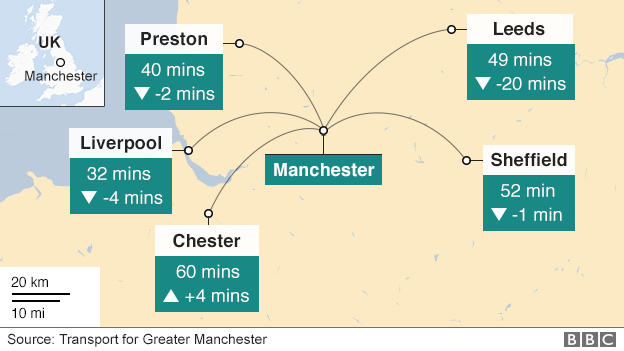Reality Check: Does the North get a raw deal on rail?
- Published

Claim: It takes longer today to get from Chester to Manchester than it did in 1962.
Verdict: True, but the fastest service on that route now stops in more places. The vast majority of other routes have seen improvements in journey times.
The Labour mayor of Greater Manchester, Andy Burnham, has argued that the north of England is underserved in terms of rail infrastructure.
He told the Today programme on BBC Radio 4 that it now took rail passengers longer to make the journey from Chester to Manchester than in 1962.
"We cannot continually be put at the back of the queue," he said. "People here - taxpayers - here deserve a modern transport system on a par with London."
Figures from Transport for Greater Manchester (TfGM) indicate that Mr Burnham is correct.
Its analysis of historical train timetables show that in 1962 the fastest service from Chester to Manchester took 56 minutes, stopping at one station in between.
Today it takes 60 minutes but makes seven station stops.
By contrast, according to TfGM, the fastest journey from Manchester to London in 1962 was 220 minutes.
It is now 124 minutes, a reduction of nearly 44%.
TfGM has also looked at how other journeys to and from Manchester have fared since 1962.
All of them are now faster.

Andy Burnham: North 'needs transport investment now'
August Bank Holiday: Where to avoid on roads and rail
A Department for Transport spokesperson said: "We are committed to improving trans-Pennine services, and are working with Transport for the North to cut journey times and increase capacity between the major cities of the north. "
Journey times are not the only way to measure improvement (or otherwise) on Britain's railways, or how the rate of progress differs between regions.
It is important to consider the number of passengers.
They made 1.7bn journeys on Britain's train network in 2016-17, 79% more than in 1962.
This is often given as a reason why most of the infrastructure investments carried out today focus on increasing capacity rather than speeding up journey times.
Gary Cooper, the director of planning, engineering and operations at the industry body the Rail Delivery Group, said: "The number of journeys has doubled in the last twenty years [after falling in the years following 1962] meaning there are more trains making more stops on a busier railway."
"While this means journey times may not have reduced in some places, it has helped to connect more communities and drive economic growth."
But is it true that communities in the North are "at the back of the queue" when it comes to transport spending?
Total government transport spending for England in 2011-2012 was £15.8bn.
That covered all forms of transport.
A third of it went to London, while only a quarter was spent on the North East, the North West, and the Yorkshire and Humber regions combined.
By 2015-16 that had jumped to £24.3bn, and proportionate spending was roughly the same.
No other English region comes close to receiving the amount spent on London - which includes the tube network and recently the Crossrail development.
Transport Secretary Chris Grayling said in an article for the Yorkshire Post, external that "unprecedented investment" has been allocated to the North between 2015 and 2021.
"We are spending £13bn on Northern transport in this Parliament - the largest in government history."
A breakdown of that figure reveals £3.8bn is earmarked explicitly for rail enhancements.
Looking ahead, it appears that London will still receive the lion's share of funding.
The think tank IPPR North looked at planned spending on projects, external that were either funded publicly or by a combination of public and private investment.
They excluded projects that spanned more than one region.
They found that per person, spending in London was set to be considerably higher in from 2016-17 onwards:
London: £1,900
North West: £680
North East: £220
Yorkshire and the Humber: £190


